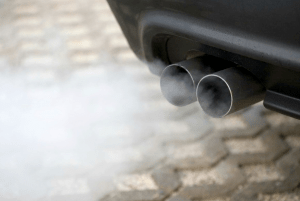
by admin | Jan 11, 2019 | Auto Repair Northern Colorado, Campus Repair, Exhaust System, Preventive Maintenance
When most people think of the exhaust system, they imagine the tailpipe and muffler. In fact, it’s much more than those two parts and has a very important job to do – protect you and your passengers from being exposed to harmful gases. The system also minimizes pollution in the environment. In this blog post, you will learn about the exhaust system along with some of the signs there’s a problem that requires exhaust system repair. You’ll also learn how you can maintain the exhaust system.
If your vehicle is equipped with a combustion engine, the proper amount of fuel and air is mixed together and ignited at the right time to run the engine. When the fuel/air is ignited, it creates noxious gases that are passed out of the engine and into the environment through the exhaust system. Any number of things can affect the performance of the exhaust system – bad spark plugs, a faulty oxygen sensor, etc. Equally, if any part of the exhaust system is faulty, you are at risk of being exposed to dangerous gases (e.g. carbon monoxide). If you delay any repairs to a faulty exhaust system, you may even begin to feel sick, fatigued, light-headed and more.
The main parts of the exhaust system
There are five main parts that make up the exhaust system. A problem with any one of these parts will affect engine performance and your safety. They are:
- Exhaust Manifold – The exhaust manifold is connected at the cylinder head and collects the gases generated during combustion and delivers them to the exhaust pipe.
- Oxygen Sensor – The oxygen sensor is continually measuring the amount of oxygen that is in the exhaust. The data it collects is then sent to the onboard computer which adjusts the ratio of fuel to air.
- Exhaust Pipes – They begin at the exhaust manifold and send gases through the system where they exit at the tailpipe.
- Catalytic Converter – Just like the name implies, the catalytic converter is responsible for changing the harmful into water vapor and less harmful gases.
- Muffler – This part “muffles” or quiets the explosions that are going on in the engine from the combustion of air and gas.
Signs that exhaust repair is needed
Any of these signs indicate that exhaust repair is needed:
- You notice the smell of exhaust fumes while driving – This is not something to ignore as it is quite dangerous to you and your passengers. The reason you are smelling the exhaust is because there is a leak in the system that is entering the cabin.
- You hear hissing, popping or loud rumbling noises – If your vehicle starts to sound louder and louder with hissing, popping or loud noises coming from underneath, most likely you will need to replace the muffler.
- You are getting less gas mileage – This could mean the oxygen sensor needs to be replaced.
- The exhaust system is plugged – Plugged exhaust is caused by the catalytic converter element breaking down and becoming lodged in the exhaust system. symptoms include poor acceleration, feeling like it is stuck in lower gear and a Check Engine Light. The engine has to have a clear path in and out for air so if the exhaust is plugged it’s like running with your hand over your mouth.
The “Check Engine Light” and the Exhaust System
The Check Engine or the Service Engine Soon light alerts you when there is a problem with your vehicle’s emissions system. The emissions are what is going through the exhaust system so it all plays a role together. If the light comes on and stays on, you should have your vehicle checked and fixed as soon as possible. By delaying Check Engine light repairs, you could end up having to replace more expensive parts, like the catalytic converter.
Maintaining the Exhaust System
Since it’s located underneath your vehicle, there’s not really much you can do to maintain the exhaust system. You can, however, make sure you wash the underside of your vehicle at least once a month, especially in the winter. That’s because the Mag Chloride on the roads will end up causing rust and corrosion. Also, have the exhaust system inspected and fix minor problems before they become costly repairs.
Let Campus Repair assist you with the maintenance and repairs on your exhaust system. When you bring your car, van or truck in for periodic service, we complete a courtesy inspection. If we see a problem with the exhaust system, we’ll let you know so you can take care of it. If you’re having a problem with the exhaust system, give us a call or stop by the shop.
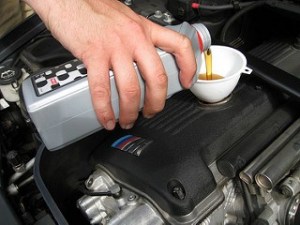
by admin | Dec 10, 2018 | Brakes
Buying a new vehicle is a steep investment. Buying a used one can be, too. The only way to maintain or increase the life of your vehicle is through preventive vehicle maintenance – that’s maintenance that is done to make sure fluids and filters are changed regularly and parts are replaced before they fail. If you want to avoid new car payments or expensive and unnecessary repair bills, a commitment to preventive vehicle maintenance is a must. Here are 8 things you can do that will increase the life of your vehicle.
- Choose high-quality fluids and replacement parts. Yes, you may pay a little more when you receive the service, but you will notice the benefits as your vehicle gets older. High-quality fluids will protect your engine parts better so everything runs better and parts won’t wear out prematurely.
- Make sure you maintain the cooling system on a regular schedule. The antifreeze/coolant is your vehicle’s cooling system does a couple of things. First, it keeps the engine from overheating. Next, the coolant is designed to protect internal engine parts from becoming rusted and corroded. Older fluid can be very detrimental to your engine. It will run hotter and parts will wear out faster. Even worse, if the engine overheats, you could face having to replace the engine… or your vehicle. Along with cooling system maintenance, replace any hoses and belts that are beginning to show excessive wear.
- Service the transmission. When was the last time you checked the level and condition of your transmission fluid? This simple fluid check can tell a lot about what’s going on in the transmission. If you have to add fluid, it smells like it’s burnt, or the fluid color looks dark brown or black, you have a transmission problem. Follow the guidelines in your vehicle’s handbook to know when to service the transmission. If you are towing with your vehicle or place a heavy load on it, you will need to change the fluid and filter more often. An important note of caution… if you have never changed the transmission fluid or filter and your vehicle is approaching 80,000 to 100,000 miles, do not go out and have this service performed. Doing so can stir up dirt and pieces of metal that can cause a problem with your transmission. Check with us before scheduling a transmission service.
- Replace belts before they break. This is especially important when it is the timing belt. Yes, timing belt replacement is expensive; however, if you wait until the belt breaks, you will most likely need to replace the engine or your vehicle.
- Maintain the tires, suspension system and brakes. This is vital. If you drive on under- or overinflated tires, tires that are wearing unevenly, brakes that need to be replaced and/or a suspension system that is showing signs of a problem, you are putting yourself and others at risk. Have the tires rotated every 3,000 to 5,000 miles and replace them when they show signs of excessive wear or the tread depth is low. Check tire air pressure once a month and add air, as needed. Replace brake pads when we let you know it’s needed. If your vehicle is swaying more around turns or vibrating more on bumpy roads, have the suspension system checked.
- Watch for any signs and symptoms that show there’s a problem with your vehicle. If you hear strange sounds when driving, notice fluid leaks under your vehicle or smell something odd when driving, get it checked out.
- If you have a garage, keep your vehicle in it. Vehicles that are garage-kept last longer than those parked outside all the time. Air pollutants cause corrosion, rain and snow cause rust, the sun will fade the plastics and fabrics in the interior.
- Clean the interior and exterior of your vehicle regularly. By keeping the exterior clean and waxing it, you will make sure the paint finish will be protected. It’s also a good idea to hose off the underbody to remove road dirt and salts. Clean and vacuum the interior once a month and apply protectant to vinyl or leather.
The simplest way to make sure your vehicle maintenance is handled regularly is to bring it to Campus Repair in Ft. Collins, Colorado. We keep detailed records of the services we perform on each vehicle. We also conduct a courtesy inspection with each service to let you know if anything needs to be replaced. Call or stop by to have us take care of your next vehicle maintenance.
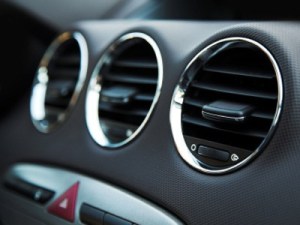
by admin | Nov 9, 2018 | Heater
Our winters in Ft. Collins, Colorado can be fairly harsh. The last thing you want is to start your vehicle to find out the heater isn’t working. If there is no air or cold air blowing out of the vents when you turn the heater on, there’s a problem with the heating system. In this blog post, we will address the items that could be causing the problem with your car’s heater. You will also learn how to maintain your vehicles heating and cooling system.
The heater in your vehicle is actually part of the cooling system. This system is designed to circulate a 50/50 mixture of water and antifreeze (a/k/a coolant) to the engine where it absorbs the heat generated during the combustion process. The cooling system then circulates the heated water/antifreeze mixture back to the radiator where it is cooled by the air before it flows back through the system. The heater core looks like a small radiator that’s located in the dashboard of your vehicle. As the heated coolant flows through the heater core, a fan blows the air into the cabin of your vehicle making it warm.
What causes the heating system to not work?
Here are some of the issues that can cause the heating system to not work properly:
- The system doesn’t have enough coolant. It’s important to regularly check the vital engine fluids, especially if you have an older vehicle. If you notice that the coolant level is low, it’s a good indicator that there is a leak somewhere in the cooling system. Add the appropriate amount of water and antifreeze and then bring your vehicle into our auto repair shop to have the cooling system repaired.
- The heater core may contain a pocket of air. Warm coolant passes into the heater core and after circulating through it flows back out via an outlet hose. If you were to feel these hoses, they should both be warm. If the outlet hose is not warm to the touch, a pocket of air could be lessening the flow of water coming out of the heater core.
- The thermostat is faulty. If the thermostat is bad, it could be preventing the engine from heating up to the proper temperature which translates into a car heater that doesn’t blow hot air.
- The heater control valve is defective. The heater control valve opens up to allow the hot coolant to flow into the heater core. When it’s defective, several things could result. The heater may not produce warm air, it could leak coolant, and/or operation of the heater can be erratic.
- Debris in the cooling system has clogged the heater core. When debris from the cooling system ends up clogging the heater core, you will have to have it replaced.
- The blower motor isn’t working. If the blower motor doesn’t work, it could be the result of electrical problems or the blower motor has failed. If this happens, you will not feel any air coming into the cabin when the blower is turned on.
- There could be a kink in a heater hose.
How can I prevent car heating system problems?
The answer to this question is simple… by properly maintaining the cooling system, the heater core will continue to work properly. Have the coolant flushed and replaced on a regular schedule. If you allow the coolant to get old, it won’t be able to adequately prevent the engine from overheating. Parts will also undergo more wear, tear and corrosion. Replace worn belts and hoses before they break and have any leaks repaired right away.
Our certified auto technicians can assist you in this area. When you bring your vehicle to our auto repair shop in Ft Collins, CO, we conduct a 25-point courtesy inspection on the major engine systems. If we notice a problem with your cooling system, we will alert you so you can have it taken care of before it becomes a major repair issue.
The best way to keep all the components of your car running properly is to trust its care and any repairs to the automotive professionals at Campus Repair. Give us a call or stop by today.
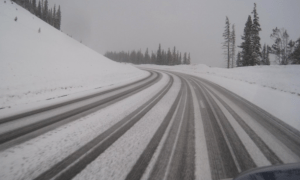
by admin | Oct 11, 2018 | Fall Car Care
The fall months are an excellent time to make sure your vehicle is ready for winter, especially in Fort Collins, Colorado. As the temperatures begin to drop, they will have an effect on different vehicle systems, some systems more than others. The following fall car care tips will help make sure your vehicle can handle the winter months.
- Make sure all the fluids are in good condition. Engine oil, antifreeze, brake fluid, steering fluid and transmission fluid all play a vital role in keeping your vehicle running optimally. They are designed to lubricate and protect engine parts from corrosion. In time, the fluids break down and they don’t protect as well as they should. Before going into winter, have the engine oil changed. You may also want to have us check the antifreeze to make sure it’s in good condition. Finally, it’s a good idea to check the brake, power steering and transmission fluid regularly. If you find that any of these are low in fluid or if the transmission fluid is black or smells burnt, you should have your vehicle checked out. Low fluid in these vehicle systems means there’s a leak or problem somewhere that needs to get fixed.
- Take care of the windshield. The worst time to find out you need new wiper blades is in the middle of a winter storm. Have them changed now. If there are any small cracks or dings in the windshield, have it repaired. Changes in temperature can cause a minor ding or crack to become a major crack. Lastly, don’t forget to top off the windshield wiper fluid. You may also want to keep some in your vehicle for those times it runs out (usually at the most inopportune time, we might add).
- How old is your vehicle’s battery? Cold, winter mornings can kill an older battery. The average vehicle battery lasts around 4 years. If yours is approaching that age, we can test it for you to make sure it has a good charge. If it’s 4 years or older, have it replaced now.
- Regularly check tire air pressure and inspect your tires for problems. Tires that are worn, bald, badly aligned or unbalanced are a serious safety risk. You can check tire pressure once a month. Also make sure you have the tires rotated and the wheels aligned on a regular schedule.
- Check belts and hoses. These parts are going through a lot of wear and tear each time you drive your vehicle. As they age and the more they are exposed to the elements, these rubber parts will weaken. They may begin to crack, split or bulge. Inspect the belts and hoses on a regular basis and replace them before they fail.
- Make sure the brakes are in good shape. Replace brake pads when they should be replaced. For more on brakes, please visit our blog post that lists the commons signs you need brake repair.
- Make sure you can see and be seen. Replace any headlamps and bulbs that aren’t working.
The simplest way to make sure your vehicle is ready for our harsh winters, is to bring it on by and have us take care of all these items for you. Give us a call or stop by today.
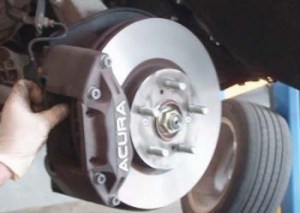
by admin | Sep 16, 2018 | Auto Repair Northern Colorado, Brakes, Campus Repair
Have you ever been driving and heard a squealing sound that stops when you apply the brakes? This is one of several signs you need new brakes. The brakes undergo wear and tear every time you apply them. How quickly the brake pads need to be replaced depends on a number of factors. Hitting the brakes all the time, driving in stop-and-go traffic and a larger/heavier vehicle can all cause brakes to wear out quicker. Read on to learn more about the braking system and some of the common signs you need brake repair.
Before we go further, if you ever have a concern about whether or not your brakes are working properly, have us check them out for you in our auto repair shop in Fort Collins, CO. It’s better to be safe than sorry, especially when it comes to being able to stop your vehicle. Brake problems can sometimes result in limited or no braking ability. In addition to the safety issues associated with poorly operating brakes, if you don’t take care of brake issues right away, you’ll end up having a much higher repair bill.
A Brake Job is Necessary When These Things Occur
- If the brake warning light comes on and stays on, there’s a serious problem with the braking system. How can you tell that it’s a serious problem? Warning lights that are “red” in color are alerting you to a critical problem. It’s important to note that, in some vehicles, the brake warning light is the same one used to alert you when the emergency brake is engaged. If you put the emergency brake on when you stopped the vehicle, make sure to disengage it before you start to drive. If the emergency brake isn’t on, but the brake warning light is on, you need to have the braking system checked right away. Do not drive your vehicle. Instead, have it towed to Campus Repair.
- There’s a high-pitched squealing sound when you drive that goes away when the brakes are applied. This is often a symptom of the wear indicators on the pads that are made to alert you it’s time for new brake pads.
- You hear scraping or grinding noises from metal-to-metal contact. Quite often, this sound is coming from brake pads that no longer have any pad left on them so the metal is scraping on and grinding into the rotor. You should have the brakes repaired immediately.
- You need to use extra pressure to apply the brakes. This is also known as “hard pedal.” Often times increased brake effort is due to lack of power assist by the brake booster. Brake boosters can run off of engine vacuum or power steering fluid. Again, have your brakes repaired immediately.
- If the brakes feel spongy or soft when you apply them, you are experiencing “soft pedal.” Your braking ability is definitely hindered, and it could be occurring because of air that’s entered the brake lines, brake lines that have gone bad, worn calipers or a master cylinder that needs to be replaced. Have the brakes inspected and repaired right away.
If you suspect there is a problem with your braking system, don’t wait to act. The technicians at Campus Repair in Fort Collins, Colorado, will inspect the braking system. During the brake inspection, we will look at the brake pads to see how much life is left on them. We will also check for evidence of rough spots or damage and will inspect the brake lines to make sure they are in good condition. Call or stop by the shop today.





